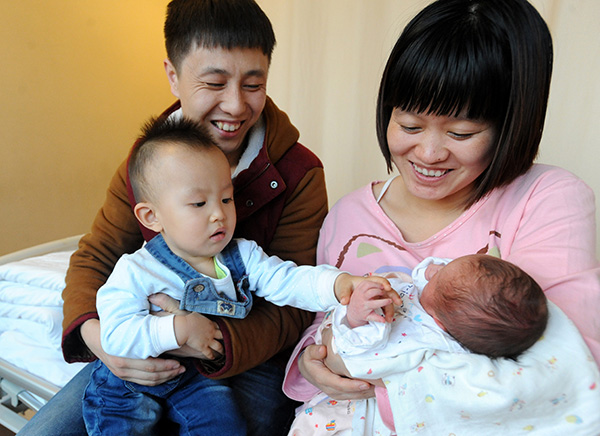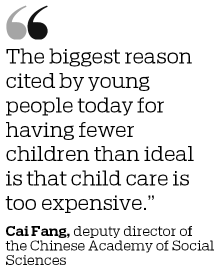Government incentives urged to increase birthrate


A renowned economist and demographer on Friday called for more supportive policies to encourage people to have children as the country faces the increasingly pressing issue of aging.
The decline in the birthrate in China is the result of expensive child care, and the government should foot the bills and lower the costs, said Cai Fang, also deputy director of the Chinese Academy of Social Sciences.
China loosened its family planning policy in 2015 to allow all couples to have two children, but the birthrate only experienced a small increase in the next year and continues to move toward a dangerously low level.
"To solve the problem of an aging population, we need to increase the birthrate," Cai said at a symposium in Beijing. "The next five years will be a critical period to curb the problem."
Organized by CASS, the symposium discussed the Communist Party of China Central Committee's blueprint for China's development in the next five to 15 years. Addressing the challenge of an aging population has been listed in the blueprint.
"This is the first time we see the problem of an aging population being placed at this high level," said Cai, adding that demographics play an important role in China's future growth.
A widely launched survey in China shows that people on average think two children is the ideal number to have, but in reality family size is smaller.
"The biggest reason cited by young people today for having fewer children than ideal is that child care is too expensive," Cai said.
Indeed, the cost of child care is quite steep, especially in big cities. The number of public day cares for infants under the age of 3 is far short of demand, and the annual cost for private organizations in Beijing is from 60,000 to 100,000 yuan ($9,120 to $15,200) or more. However, Beijing's average annual salary was 166,800 yuan in the non-private sector and 85,260 yuan in the private sector in 2019.
Cai suggested that the government should pay for more related services, such as maternity healthcare, baby care and education.
"The government should also take good care of seniors, because in most Chinese families grandparents are the care givers for babies," he said, adding that a good elderlycare policy will give young people good faith to have more children.
The fertility rate required to keep a population stable is 2.1 children per woman, But the fertility rate in China has fallen to somewhere around 1.6.
Since 2014, the 15 to 64 year-old demographic has started to show negative growth. People aged 60 or above totaled 254 million last year, about 18 percent of the population. But forecasts show that the number may reach 500 million in around 2050, which means that one out of three people in China will be aged above 60.
Six other experts from the Chinese Academy of Social Sciences also joined the symposium, sharing their thoughts on key issues such as environmental protection, building an open economy and rural development.
pengyining@chinadaily.com.cn

- China's light sports aircraft gains core independence with homegrown engine and avionics
- Record number of black-necked cranes arrive at Guizhou's nature reserve
- New morning and evening peak-hour trains to run between Beijing and Xiong'an
- College student rediscovers figure skating passion
- Wuhan scientist honored for turning lab science into real-world farming solutions
- Citizen rewarded 200 yuan for turning over ancient sword to Hubei museum



































